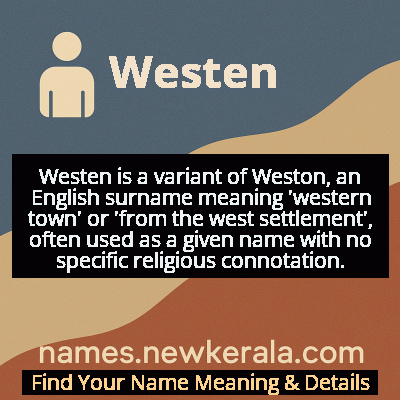Westen Name Meaning & Details
Origin, Popularity, Numerology Analysis & Name Meaning of Westen
Discover the origin, meaning, and cultural significance of the name WESTEN. Delve into its historical roots and explore the lasting impact it has had on communities and traditions.
Name
Westen
Gender
Male
Origin
Christian
Lucky Number
5
Meaning of the Name - Westen
Westen is a variant of Weston, an English surname meaning 'western town' or 'from the west settlement', often used as a given name with no specific religious connotation.
Westen - Complete Numerology Analysis
Your Numerology Number
Based on Pythagorean Numerology System
Ruling Planet
Mercury
Positive Nature
Adventurous, dynamic, curious, and social.
Negative Traits
Restless, impatient, inconsistent, prone to indulgence.
Lucky Colours
Green, white.
Lucky Days
Wednesday.
Lucky Stones
Emerald.
Harmony Numbers
1, 3, 9.
Best Suited Professions
Sales, marketing, travel, entertainment.
What People Like About You
Versatility, charisma, adventurous spirit.
Famous People Named Westen
Westen Champlin
Musician
American guitarist known for musical collaborations and performances, continuing family musical legacy
Westen H. Derrick
Military Officer
19th century US Army officer who served during Indian Wars and contributed to military strategy development
Westen Charles
Business Executive
Technology leader known for innovative approaches in digital transformation and corporate strategy
Name Variations & International Equivalents
Click on blue names to explore their detailed meanings. Gray names with will be available soon.
Cultural & Historical Significance
In American cultural history, Westen carries additional significance through its connection to westward expansion. The concept of 'going west' became deeply embedded in the American psyche during the 19th century, representing opportunity, freedom, and Manifest Destiny. While the name itself predates this era, its modern usage often unconsciously taps into this cultural mythology. The transformation from surname to given name in the 20th century reflects broader naming trends but also suggests a continued fascination with the symbolic power of directional names and their association with exploration and progress.
Extended Personality Analysis
People named Westen are typically perceived as natural adventurers with a strong independent streak. The name's directional quality suggests someone who is always looking toward new horizons and opportunities. They tend to be forward-thinking individuals who embrace change and innovation, often serving as pioneers in their chosen fields. Their connection to the 'west town' meaning provides a grounding influence, making them practical and community-oriented despite their exploratory nature.
Westens often demonstrate a unique balance of visionary thinking and practical application. They're typically reliable, steady individuals who inspire confidence through their calm demeanor and thoughtful approach to challenges. While comfortable leading, they also value collaboration and often excel at bringing diverse groups together. Their personality reflects the journey westward—they're comfortable with uncertainty and change but maintain strong connections to their origins and values. This makes them particularly effective in roles that require both innovation and stability, such as entrepreneurship, leadership positions, or creative fields where they can explore new ideas while maintaining practical foundations.
Modern Usage & Popularity
In contemporary naming practices, Westen maintains a distinctive but modest presence. It's primarily used in English-speaking countries, with the United States showing the highest concentration of usage. The name has never achieved widespread popularity, which contributes to its appeal for parents seeking unique yet recognizable names. Current naming trends that favor surname-style first names and directional names have helped sustain Westen's usage, though it remains outside mainstream popularity. The name is particularly favored in western US states where the cultural mythology of westward expansion remains potent. Its usage patterns show consistency rather than dramatic spikes, suggesting it appeals to a specific demographic that values its combination of tradition and individuality. The similar name 'Weston' has seen greater popularity, which may influence some parents to choose Westen as a more distinctive alternative while maintaining the same general sound and feel.
Symbolic & Spiritual Meanings
Symbolically, Westen embodies the powerful metaphor of journey and discovery. The west direction has profound symbolic weight across cultures—representing the unknown, adventure, and the future in Western traditions, while in Eastern philosophies it often signifies metal, autumn, and completion. The name suggests someone who moves toward new possibilities while carrying the wisdom of experience. The 'town' element adds layers of community, stability, and belonging to this journey symbolism, creating a balanced metaphorical meaning of exploration grounded in connection. In psychological terms, Westen represents the archetypal hero's journey—venturing into unknown territories, facing challenges, and returning transformed. This makes the name deeply resonant in modern contexts where individuals navigate constant change while seeking meaningful connections. The sunset association of the west direction adds contemplative qualities, suggesting someone who values reflection and understands cycles of ending and beginning.

